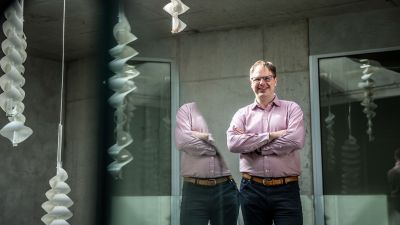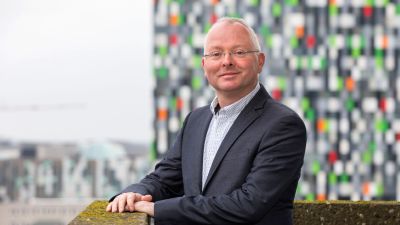"Excellence and success breeds more success. The key to success is to attract truly high quality students and staff. It's great to have great buildings and facilities, but in the end it's all about people," Irene Tracey, Vice-Chancellor of Oxford University, who attended this year's celebrations in Prague on 17 November told Forum magazine.

"Don't be afraid to try new things," says Irene Tracey, Vice-Chancellor of Oxford University.
You visited Prague on the occasion of the celebration of International Students' Day. What would be your message for students at Charles University? What skills should they learn and how to get ready for the future?
Well, firstly, they are very lucky to be at such a great university. They should recognise that they are having an experience that is very privileged. This presents a real opportunity to develop their thinking, not just in their subject area, but also in their understanding of the world.
As students, you develop the lifelong skill of learning how to learn. You also have the freedom to explore many different areas. I often say to our students in Oxford, your job is to go out equipped with all these abilities that we give you and then to use them as wisely as you can and to try and put more into the world than you take out of the world.
So I wish them all the very best and I ask them to take moments to reflect on the students who have come before, who have given them the opportunity to have this special experience. And of course enjoy themselves, but really use the opportunity to try new things. Because often it is the thing you do beyond your subject area that might end up being your passion and what it is that you want to spend the rest of your life doing. If you don't open yourself up to new experiences, you might miss discovering what that could be.
 Do you have any special recommendations, especially for Czech or Slovak students, who want to study at Oxford?
Do you have any special recommendations, especially for Czech or Slovak students, who want to study at Oxford?
Currently, we have about 65 Czech students, both undergraduates and graduates, at Oxford. They are always fantastic. We welcome all applications. It is a competitive process because Oxford is obviously a big global university. Gaining a place is challenging, and our teaching approach is intense, aiming to develop your abilities to argue, think critically, and do so confidently.
However, if you think that it is the type of learning environment you want, then absolutely put your hat in the ring, apply and fingers crossed it will work out and I look forward to welcoming you on degree day.
How do you deal with the changes after Brexit?
That is something which we are still working through. I think, as a country, we are really just this year starting to feel the effect of Brexit – until this year many of the effects were allocated to the consequences of the pandemic.
At the university level, we are clearly feeling the impact, especially in terms of the number of foreign students, because they are now having to pay fees. We are trying to offer more scholarships and other ways so that finances are not a barrier.
Oxford has been ranked as the best university in the world eight times in a row. Is it difficult to run such a university? What is your key to success?
Yeah, well, rankings are great, of course, we always celebrate, but I do not get overly concerned about the rankings. And I think most heads of universities do not because we recognise the criteria change and as long as you are in the top ten, that is very impressive especially for public universities, because you are competing against private institutions with extraordinarily deep pockets of wealth.
The rankings show that universities that do well in the rankings are doing something exceptional. It is of course very pleasing for us to be ranked first for the eighth time. It is testament to the excellent staff and students at the university. But I dare say that will change one day, but we hope to remain among the best universities in the world because, it helps attract really good students and staff.
Do you have any specific recommendations for other universities? How to get better?
I think for all of us going forward is to think about how we can partner, be a little bit more collaborative and share good practice. That's how we can all help build excellence and bring each other up. Because we compete for the students and staff, sometimes we end up being siloed as institutions and the rankings don't help because they sort of drive that competitiveness.
However, as individual academics, we are actually quite collaborative. So what we need to do is take that individual mode of collaboration at an institutional level. And that's something I'm very keen to do is to think about how we can work more in partnership and share good practices. And, you know, excellence and success breeds success. So again the key is attracting really high quality students and staff. It's great to have amazing buildings and facilities, but at the end of the day it's all about the people. So people for me have been one of the areas I very much focused on for my leadership goals.
And I think we as a university sector have perhaps not paid enough attention to our staff in terms of the conditions in which they work or the salaries. Those are some of the areas I want to focus on, because if you have great people, you attract great students and then you have excellent results.

"I think for all of us going forward is to think about how we can partner, be more collaborative and share good practice," says Irene Tracey.
As the Vice-Chancellor of the University of Oxford, you have gained attention and influence. What impact would you like to have? What do you want to change?
For my seven-year tenure, I have set four areas. The first area is teaching. I want to make teaching and learning visible and valued. As a research-intensive university, I think we don't talk much about teaching. Yet it is an extremely key part of everything we do. Every year we send thousands of graduates out into the world who are changing the world for the better. So I think the challenge for all universities in general is to encourage our academics to want to teach and do research at the same time.
The research obviously needs to keep supporting. I really want to focus on creating the innovation ecosystem, creating new job opportunities... It could be a great way to keep more of our students in the region, as they often come to study but then leave Oxford again.
Another theme is local and global engagement. What I mean by that is that I want the university to be a good citizen of our city and for our local people to feel pride and a sense of value that the university is there for them. In terms of global engagement, I want to think more strategically about how we want to impact the world, for example, by addressing and actually finding and bringing specific solutions to climate change, but also to issues like conflicts in the world and sustaining democracy.
Last but not least, there are our people. I really want to look after our people more, to pay them better, to improve their working conditions – to make us the most attractive place for them.
In the role I have, I am aware that Oxford is a big brand and it is an incredible platform and voice in my role. I use my influence very carefully for the whole higher education sector, both nationally and internationally.
Using my voice and my platform to champion that ideal is something I'm very conscious of and excited actually about the role. And it was one of the areas that eventually persuaded me that I should apply for the position, and that the cost of no longer being an active scientist and having to give up my lab was benefited and offset by that opportunity. I can now advocate for the things I really care about, whether it is the role of British, European, and global universities, or in terms of contributing to society and making societies better and more stable.
You also support women in science. In your opinion is there still a need to emphasize gender? What needs to happen for us as a society to stop discussing gender and focus on personal qualities or results?
I'm glad you've asked this question. The gender issue and gap are not over. Full stop! Many believe it is over, but we must be prepared with data on the gender pay gap, promotion differences, biases… We are far from done about gender! So whilst of course we develop EDI (Equality, Diversity and Inclusion) and we think about inclusion in its border sense, half the world is women and we have a gender problem. And we should always keep in our mind it is not only about women, there are also other minorities. We have work to do. I think also as a visible woman and a woman from STEM, it helps to speak about these issues.
Do you have any recommendations for female leaders?
Here I must admit that I have only quite recently realised how important it is to be a woman. I never thought it mattered so much. I was just doing my job, running an imaging center or a department. It really wasn't until a few years ago that I realized that being a woman matters because the visibility of role models – other women in leadership positions or those who have chosen to combine career and family – is huge.
As a scientist, I'm very data-driven. And we have to look at them and ask, where there is a decline, why is there a decline? Why are women giving up at this point, why aren't they applying when there's a new job? Now if there is a selection process at Oxford University and the shortlist is all men, the committee has to write to me for permission to go ahead and explain why there are no women. Even little things like that can be of great importance, because they raise the question, have you tried hard enough to find credible women? Whether you just gave up too soon and whether it's not enough to look a little harder.
How do you perceive the role of science in society and how to deal with misinformation?
Well, I must say that science is very important. As scientists, we strive to be data-led; however, with social media platforms, it's more challenging to discern what's true and what isn't. And sometimes people don't really care either anymore whether it's true. They move on by the time you've found out what the truth is, they're onto something else. I think educating people is extremely important. We have a scientific illiteracy that needs to be improved more broadly, which is closely related to science communication.
And from my experience when you do communicate science to people well, they love it. They want to know more. They really experience the joy of what science uncovers about understanding the world. It is also a role for our politicians and our media to be better educated in science because they need to understand some basic principles if they're going to handle the material and the questions.
And this is something that I'm very keen to do. We're starting a new course in Oxford where our undergraduates who are doing the humanities courses, and the scientists, they're all going to come together and they're going to learn from each other through the lens of climate. Scientists will be equipped in humanities, and humanities will be equipped in sciences. It's a small way we can contribute to the conversation but important, because we need experts who understand each other.
Oxford University is also a great example in supporting innovations and application of research results – what is your recommendation?
I think a crucial development was that, fifteen years ago, we created a special fund to support an entrepreneurial mindset and foster a positive environment. What is particularly pleasing is that we are not focusing only on startups in life sciences and deep tech, but we also do a lot in social science, with the aim to do social good. We want to extend this unique environment and welcome other partners and together go to another level.
Your new position must be demanding. Are you able to turn it off? How do you relax?
Yes, I am. I have always tried to do that, because it is really important to be able to just switch off. As a neuroscientist, I realize that the brain needs to rest, you need to have good sleep and moments where you can relax and think. In this new position, my mental capacity is definitely being used a lot more than ever before. I think about work all the time, and I knew that would be the case. But that's okay, I can handle it.
Family, obviously, is a great way for me to switch off from work, because one can be just absorbed by them and their needs. I have three children – two have grown up and gone, one at home. I'm also very sporty, I don't do as much as I would like, but I still enjoy my running and that is really helpful. I also enjoy playing the piano. I think I'm good at turning my job off.


















